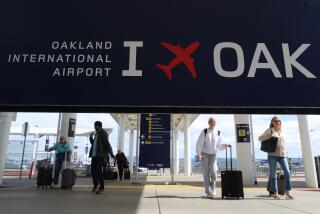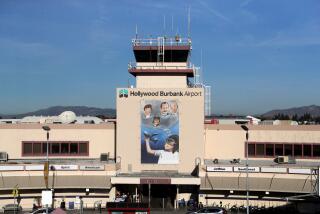McConkey Proposes Burbank Become Sole Airport Operator : Transportation: As expansion controversy heats up, he suggests ending partnership with Glendale, Pasadena.
- Share via
PASADENA — In an unprecedented mega-meeting on the future of Burbank Airport, the city councils of Burbank, Glendale and Pasadena gathered Monday night with the airport’s governing authority--and heard a suggestion that Burbank take over the airport from the other two cities.
“I think we should get the cities of Glendale and Pasadena out of the operation of the airport,” said Burbank Councilman Ted McConkey.
“The people who bear the impact should operate the airport,” he said, referring to its location in Burbank.
Breaking up the three-city partnership would involve ending the Joint Powers Agreement that they established in 1978 to buy the airport from the Lockheed Corp. and prevent its closure.
“The time has come to seriously consider whether the JPA should continue,” McConkey said, drawing gasps of surprise from the audience.
He made no immediate reference to reimbursing the other two cities at the meeting, which continued well into the night.
It was not clear whether McConkey spoke for the Burbank delegation as a whole, nor what course the two cities would take, but McConkey got a sympathetic reaction from Chris Holden, vice mayor of Pasadena.
Saying he is open to at least discussing such a proposal, Holden commented: “There is some question as to whether Pasadena and Glendale should even be a part of this process.”
The meeting was brought on by debate over controversial plans to expand the airport, which is popular with many air travelers but has generated complaints about jet noise.
The joint meeting between the cities, which currently share a fire and police dispatch center and are discussing plans to combine their utility companies, was the first of its kind since the Airport Authority was created 17 years ago.
Twenty city council members--two were absent--and three city managers met in the crowded chambers of the Pasadena City Council with eight of the nine members of the Burbank-Glendale-Pasadena Airport Authority, who are appointed by the councils of the three cities but function independently.
As expected, Burbank city officials presented a list of demands, conditioning their approval of the airport’s expansion on the imposition of a late-night mandatory curfew, the development of a 20-year master plan for the airport, a strict noise abatement policy and a cap on the number of flights.
Although Burbank, like the other cities, appoints only three of the nine members of the airport authority, each city can block major changes such as the proposed expansion.
For many years, some Burbank residents have complained bitterly about jetliner noise. Protesting that their complaints went ignored by airport authorities--and that air traffic patterns spare the other two cities--they increasingly have made airport noise a local political issue.
After the spring municipal election shifted control of the Burbank City Council to the anti-noise faction, plans to build a new, larger terminal came to a halt. Saying they were being left out of decisions about financing, council members took action to block the proposal, leading to Monday night’s meeting.
Earlier this month the council dissolved a collaboration agreement with the Airport Authority, under which the council accepted the concept of an expanded terminal and agreed to rely on the authority’s consultants to determine the best size and location for it.
At its meeting last Tuesday, the Burbank City Council drew up 11 conditions that the Airport Authority would have to meet to get Burbank’s support for the expansion. Chief among them is a controversial mandatory curfew on takeoffs between 10 p.m. and 7 a.m., which would need FAA approval.
Most city officials did agree on one thing: The popularity of the Burbank Airport is steadily increasing.
In 1994, 4.8 million passengers used the airport, and annual passenger levels are projected to reach 5.4 million in 1998 and 10 million in 2010.
The terminal project is designed to proceed in two phases. First, the size of the terminal would triple by 1998, with five more aircraft gates added to the current 14. Eight more gates would be added by 2010.
Glendale officials wanted a strict agenda for the joint meeting, outlining their terms in a city memo July 20. They wanted discussion limited to how each city views its role as airport operator and interprets the Joint Powers Agreement, and what each believes should be the relationship between the cities and the Airport Authority and what process should be used for resolving their differences.
But Burbank and Pasadena officials insisted on an open agenda that would cover any issue relating to the airport.
More to Read
Sign up for Essential California
The most important California stories and recommendations in your inbox every morning.
You may occasionally receive promotional content from the Los Angeles Times.













